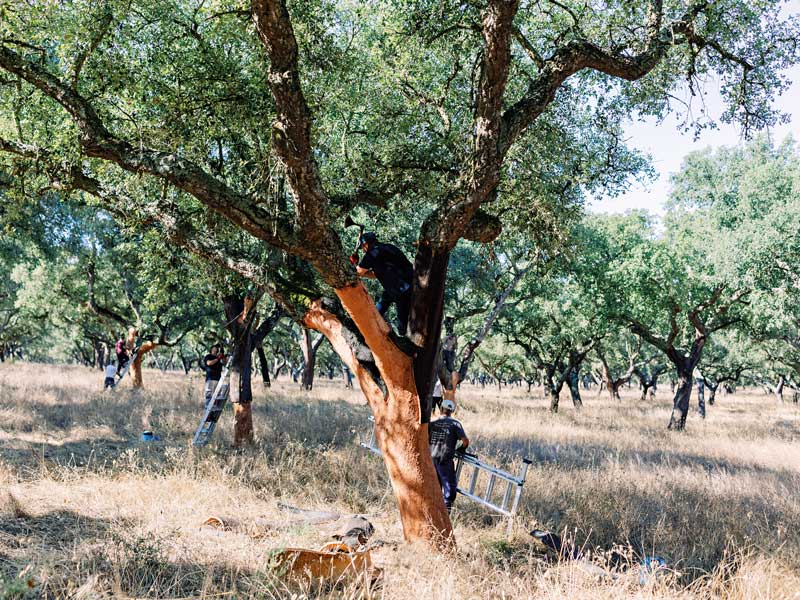
Cork is one of nature’s most remarkable materials. It is a renewable, biodegradable, and versatile resource, cyclically harvested without damaging the trees it comes from. It grows in the Mediterranean, where, for centuries, cork oak forests have not only supported a diverse ecosystem but also acted as vital carbon sinks, capturing large amounts of CO2.
Recognised as World Finance’s Most Sustainable Company in the Wine Products Industry, at Amorim, our role has been to take this naturally sustainable material and find new, innovative applications for it. Though most widely known for cork stoppers, which we produce at a scale of over 5.6 billion annually, cork is being utilised in increasingly diverse industries. Our work spans from creating products for the aerospace sector to eco-friendly sports infills, demonstrating the adaptability and potential of cork beyond its traditional uses.
Innovating with every stopper
One of the key areas of our business remains the production of cork stoppers for wine, spirits, and sparkling wines. Each day, we manufacture over 22 million stoppers, serving markets like France, Italy and the US. But it is not about quantity – our research and development team continues to refine the quality and sensory performance of these stoppers, ensuring they meet the highest standards.
A critical part of our sustainability actions involve responsible forest management
A major breakthrough has been our ability to produce cork stoppers with non-detectable levels of the molecule Trichloroanisole (TCA), a compound that can affect wine. This achievement combines traditional craftsmanship with scientific research and innovation, benefitting both winemakers and consumers.
Cork processing companies are a driving force in creating an economic interest for forest owners to maintain their properties. As such, cork stopper production, as the most valued product in this ecosystem, makes a significant contribution to climate change mitigation, making it a much more sustainable choice than alternatives such as aluminium or plastic.

A key principle in our operations is ensuring that no part of the cork goes to waste. Any cork that is not used for stoppers is repurposed into other applications, from flooring and insulation to advanced materials for industries like aerospace. This approach allows us to operate within a 100 percent circular economy, where every byproduct is transformed into something valuable.
Amorim Cork Composites is a prime example of how this circular economy works. The by-products originating in the cork stopper manufacture are ground down and used to develop innovative products, demonstrating how sustainability and innovation can go hand in hand. With the growing demand for sustainable materials across a variety of industries, we are constantly exploring new applications for cork.
Forest management and climate action
Our work is not limited to what happens in the factory. A critical part of our sustainability actions involve responsible forest management. Cork oak forests not only supply the raw material we need but also play a vital role in capturing CO2. We have implemented innovative practices to make cork oaks more resilient to climate change, pests, and diseases, while also planting new forests and improving the health of existing ones.
In fact, through a combination of research and intervention, we are working on decreasing the time it takes for the first cork harvest from 25 years to just 10–12 years. This increases the economic interest and viability of the forest.
For every tonne of cork harvested, the forest is capable of sequestering up to 73 tonnes of CO2
Cork oak forests are one of the world’s natural carbon sinks: for every tonne of cork harvested, the forest is capable of sequestering up to 73 tonnes of CO2. This ability to capture carbon and retain carbon for long periods of time, since the tree is not cut down and lives an average of 200 years, makes cork one of the most environmentally friendly materials available today.
According to a life cycle analysis conducted by PwC Naturity, cork stoppers are significantly superior to artificial closures in five of the seven indicators analysed. Namely, non-renewable energy consumption, solid waste generation, contribution to the formation of photochemical oxidants and the contribution to the eutrophication of surface waters and greenhouse gas emissions. These findings reinforce cork’s position as a sustainable material with significant environmental benefits, particularly in reducing our carbon footprint.
More than 150 years of history
Corticeira Amorim is the largest global exporter of cork and the oldest cork company in the world in continuous operations since 1870. We are also the world’s largest cork processing company, with a presence in almost 30 countries in five continents and the largest distribution network in the sector. We have a diversified client base of over 30,000 customers and more than 93 percent of our sales are made outside of Portugal, where we are based.
Sustainability is deeply rooted in Corticeira Amorim’s DNA, and we are proud to see our efforts recognised with this award, which highlights our commitment to efficient resource management, sustainable consumption, process circularity, ecosystem protection, and the development of our people.


